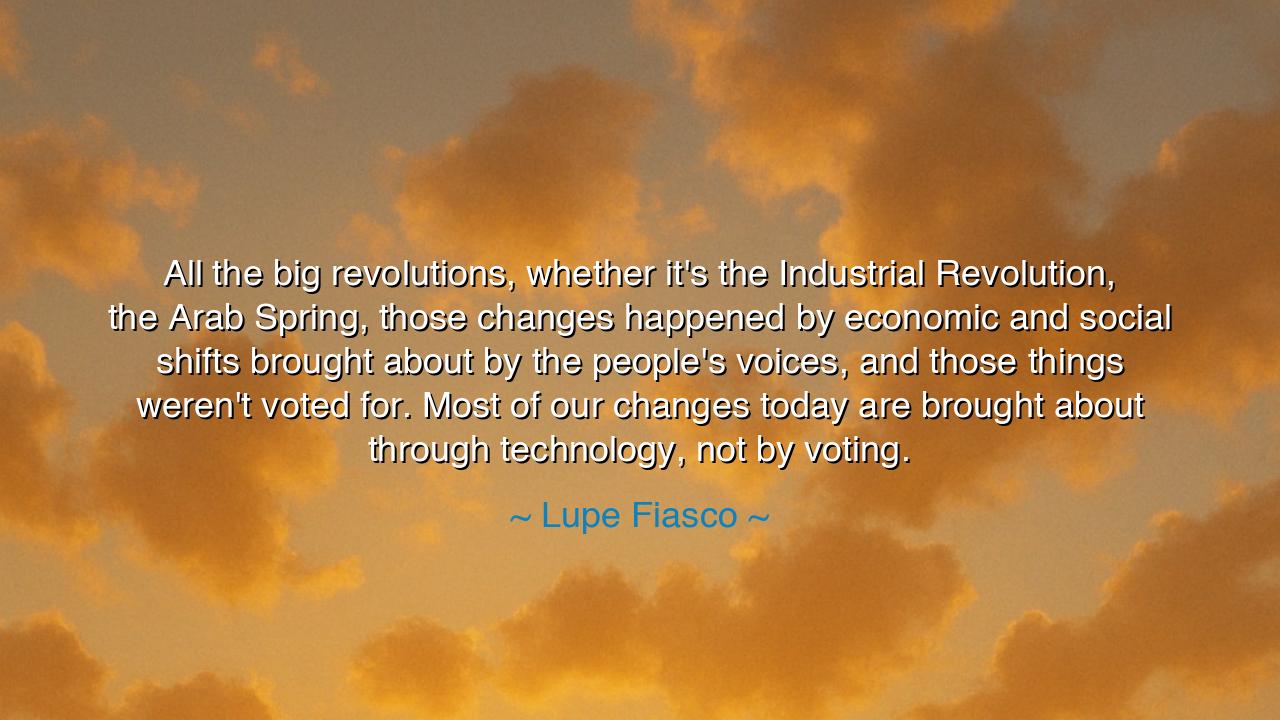
All the big revolutions, whether it's the Industrial Revolution
All the big revolutions, whether it's the Industrial Revolution, the Arab Spring, those changes happened by economic and social shifts brought about by the people's voices, and those things weren't voted for. Most of our changes today are brought about through technology, not by voting.






Lupe Fiasco, poet of rhythm and prophet of the modern struggle, once spoke these words: “All the big revolutions, whether it’s the Industrial Revolution, the Arab Spring, those changes happened by economic and social shifts brought about by the people’s voices, and those things weren’t voted for. Most of our changes today are brought about through technology, not by voting.” His words are a clarion call, not only describing the past but unveiling the true engines of change that shape the destiny of nations and civilizations.
The heart of his declaration lies in the recognition that revolutions are rarely birthed by ballot boxes. Though voting is a sacred instrument, it is slow, cautious, bound by rules and institutions. The great upheavals of history, however, often erupted when the people themselves rose up—when the weight of economic suffering and social unrest grew too heavy for any government to contain. In those moments, it was not the laws written in parliament that reshaped society, but the raw and thunderous cry of humanity demanding change.
Consider the Industrial Revolution, that mighty turning of the world. No vote decreed that factories would rise, that steam would conquer rivers, or that machines would alter the rhythm of human labor. Instead, it was the march of invention, the pull of markets, and the swelling tide of urban migration that rewove the fabric of existence. Governments merely followed in its wake, writing laws to regulate what had already transformed the people’s lives. Thus Lupe Fiasco reminds us: true revolutions erupt not from ballots, but from the combined forces of economy, society, and technology.
He names also the Arab Spring, a more recent testament. Here, the catalyst was not legislation, but the people’s voices, amplified by the power of technology—social media, cell phones, and the internet. With these tools, truth traveled faster than repression could silence it. Crowds gathered, dictators trembled, and centuries of silence were broken in an instant. The ballot did not summon these movements; it was the collective cry of the oppressed, multiplied by new instruments of communication, that ignited the fire.
History abounds with similar examples. The American Revolution was not voted into being by the British Parliament—it was sparked by resistance to economic oppression, fueled by pamphlets like Thomas Paine’s Common Sense, and carried forward by muskets and courage. The French Revolution, too, was not decreed by royal order, but by bread riots, assemblies in secret halls, and the storming of the Bastille. In each case, it was the people’s voices, born of need and amplified by circumstance, that brought the old order crashing down.
Lupe’s words also serve as a mirror to our present. He warns that today, it is technology—not governments—that wields the power to transform. A new app, a platform, or an algorithm can alter economies, topple industries, change how humans communicate and even how they think. None of these shifts are put to a vote. They arise swiftly, driven by innovators and adopted by the masses, reshaping societies while laws stumble to catch up. Technology has become the great unseen legislator of our age.
The lesson, O seekers of wisdom, is clear: never place all your faith in the ballot alone. Honor it, for it is sacred, but know that true power lies in the collective voice of the people, in the choices made every day, and in the technology that amplifies or distorts those voices. If you wish to shape the future, do not wait only for elections; speak, act, create, and master the tools of your age. For revolutions are not granted from above—they are born from below, from the restless will of humanity itself.
Therefore, let Lupe Fiasco’s words guide you: raise your voice, use technology with wisdom, and recognize that the tides of change flow not from votes alone but from the living heartbeat of the people. Stand ready, for revolutions will come again, and their power will be forged not in silence, but in the unyielding cry of those who refuse to be forgotten.






AAdministratorAdministrator
Welcome, honored guests. Please leave a comment, we will respond soon